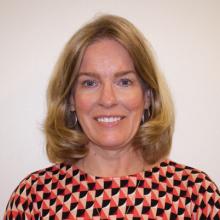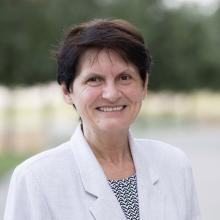Supporting Graduate Students Along the Road to Graduation
As an R1 Christian research university, Baylor is focused on the development of outstanding graduate students who will “fling their green and gold afar” with excellence in their chosen field. This focus, undergirded by Baylor’s foundational Christian mission, shines a light on people, like Baylor graduate students. Embedded within the relationships between faculty and student is an aspect of stewardship, to help him or her succeed.
How does Baylor work with students to help them along the way? Two graduate program directors in exemplary Baylor programs—Jane Harvill, Ph.D., professor of statistical science in the Department of Statistical Science, and Lidija Novakovic, professor of New Testament in the Department of Religion—share examples from within their own departments.
Q: In what ways does recruitment play a role in graduation rates and student success?
Jane Harvill: I think our department, and specifically the faculty, do really well for the students who are willing to put in the work. First of all, we don't admit people that we don't believe have the ability to succeed. So, our application and admission process is very competitive. We look for students who score highly on the quantitative part of the GRE. We also look at grades, very specific classes and letters of recommendation in the vetting process. There are so many students who want to come to our graduate program that it is important for us to make sure we’re welcoming someone who can be successful.
We’re also looking for people who are good departmental citizens: who are involved in the community as undergraduates, who make good grades, and are hard workers. So, we bring in people that match our culture, match our fit, and who can succeed academically. Even before they get here, we're working toward getting them through successfully.
Lidija Novakovic: In the first place, it very much matters whether we get quality students to the program. After a careful review of all applications, we invite the top four applicants in each area of concentration (we have four) for a preview weekend on campus, which allows us to interview them and identify those who can succeed in the program. We have also revised our doctoral program after an external review two years ago, reducing required coursework from almost three years to two years—from 48 to 36 credit hours. Even before that change, the program was very successful.
We accept eight students each year and have 7-10 graduating with their Ph.D. annually. But now that coursework is shorter, students will be able to complete the qualifiers for advanced standing sooner and have more time to write their dissertations. This has a positive effect on how students feel and how quickly they progress. Last but not least, there is increased awareness on the Department of Religion’s part about the importance of advising, mentoring, and working closely with students.
Q: Once a student is here, what does mentorship look like? To use the analogy of a marathon, how do you help a student make sure he or she is hitting their mile markers and progressing toward timely graduation?
Jane Harvill: To me, mentorship is about the whole person: allowing them to grow in the direction that God intended them to and really, really, really working to make sure that they become a whole, healthy person in whatever avenue that is. I think all of the people in my department, and I think Baylor faculty as a whole, feel that this is the way to mentor and grow our students and help them become successful.
It's important to give positive feedback as well as negative feedback, because if all of students hear is you're not doing it right, they may give up. We get to know them and notice if they’re struggling in an area or missing something in their homework, and will sit down with them and go back to first principles and figure it out. But we also notice what they’re doing right. And it’s important that we all see that, to pair them up with the right advisors who say, ‘I really like this student, I like what they’re doing and I’d like to work with them.’ We work hard to match students with advisors where there’s a connection and a constant flow of communication, mentoring and teaching.
Lidija Novakovic: A place to start, we have a really clear and very detailed program guide. So, a student coming to our program from day one knows what is expected. After the first year, we have a formal review when students meet with their faculty advisors, and all the professors with whom they had seminars that previous year have to send written reports about how the student did in the course, describing strengths and weaknesses.
The students also write personal evaluations of their own successes or problems, where they see still gaps in knowledge, working habits, and skills. These reviews are conducted in a very friendly and encouraging atmosphere, and students can make adjustments if necessary. So, there is a good sense already after the first year if there are problems, and they are registered. A second review comes by the end of the second year, since students have no coursework thereafter. From there, they can start preparing for qualifiers for advanced standing until they achieve ABD status.
Q: Where are some of the places we’d find you preparing your graduate students to be excellent future professionals?
Jane Harvill: Statistical science is interdisciplinary, and you’re constantly working with people who have their own different disciplinary languages. And we work with every industry. We're meeting some type of standard all the way up to the space shuttle, the computer chips that are manufactured for those have statisticians overseeing the manufacturing process to make sure certain quality standards are met.
But we also have students that work Eli Lilly, or for Baylor Scott & White Health. We have students who work for Microsoft for Google, so outside of Baylor, they stay involved. We also have graduate students who have worked the Baylor Collaborative on Hunger and Poverty. We fundamentally involve students in that outreach, which is hugely important. And while it is beyond the scope of what the professors in the department do in terms of research, our professors are involved as well.
Lidija Novakovic: Let me share some numbers with you. Last year, we had 31 publications by 19 students. These publications are peer reviewed, appearing in academic journals, book chapters, encyclopedias, and so on. They help students be successful on the market eventually, but it is also important that they do not to slow down their dissertation writing. When I was in graduate school, there was much less pressure to publish than there is now. We work with students to have a healthy balance between progress on their dissertations and their conference presentations and publications that will help them on the job market.
Teaching is another area where our students excel. In addition to the teaching resources and workshops Baylor offers—which we plug them into—all graduate students participate in a teaching colloquy offered by the Department of Religion in their fourth year before they become teachers of record in their fifth year. We also encourage dissertation mentors to attend their classes and provide feedback to help them.
In addition to the personal focus within individual departments, Baylor offers a number of resources to graduate students to support him or her as a whole person. Click here to learn more about these diverse offerings to enhance a student’s journey toward success.
You can read more about the Baylor Graduate School's efforts toward holistically supporting students in the 2023 Annual Report.
ABOUT BAYLOR UNIVERSITY
Baylor University is a private Christian University and a nationally ranked Research 1 institution. The University provides a vibrant campus community for more than 20,000 students by blending interdisciplinary research with an international reputation for educational excellence and a faculty commitment to teaching and scholarship. Chartered in 1845 by the Republic of Texas through the efforts of Baptist pioneers, Baylor is the oldest continually operating University in Texas. Located in Waco, Baylor welcomes students from all 50 states and more than 100 countries to study a broad range of degrees among its 12 nationally recognized academic divisions.

